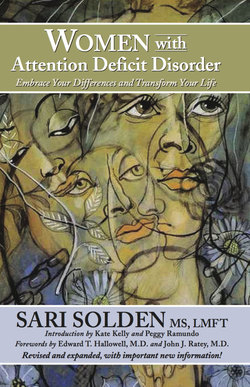Читать книгу Women With Attention Deficit Disorder: Embrace Your Differences and Transform Your Life - Sari Boone's Solden - Страница 16
На сайте Литреса книга снята с продажи.
Diagnosing AD/HD is Complex
ОглавлениеHowever, even if you have had challenges all your life, they may have been masked by structure or support or because you were very smart or creative. You may have compensated all your life in ways that kept the symptoms under control, or you may have self-medicated without knowing that’s what you were doing.
What can be even more confusing is that even though you may have these difficulties over time, you may not have had them consistently. As Thomas Brown, Ph.D. puts it “they may be chronic but not constant.” (1999, pg. 3) They may vary from situation to situation. You may have done some things very well and have had significant gaps in other areas. To complicate the diagnostic picture even more, no two people with AD/HD will have the exact same problems.
AD/HD can be best understood by explaining the executive, or management, function of the brain. Thomas Brown, Ph.D. leading expert in adult AD/HD from the department of psychiatry at Yale University illustrates this condition as he lectures about executive function with the metaphor of wonderful musicians trying to play together in an orchestra without a conductor! Executive functioning is described in more detail in Chapter 5, but it has to do with shifting, starting, dividing, stopping, and starting your attention. It includes the following:
•Activating your brain to begin to work.
•Maintaining attention in the midst of distractions.
•Sustaining attention when energy and interest fade.
It is extremely important to understand that while AD/HD is a serious disorder, it is not characterological or psychological, but neurobiological. This means it’s not your fault, but it’s how your individual brain works. It does not mean you have brain damage.
While no one knows exactly what causes AD/HD, it is commonly understood to be genetically transmitted. You are born this way, and there are probably others in your family who either have or have had these difficulties.
